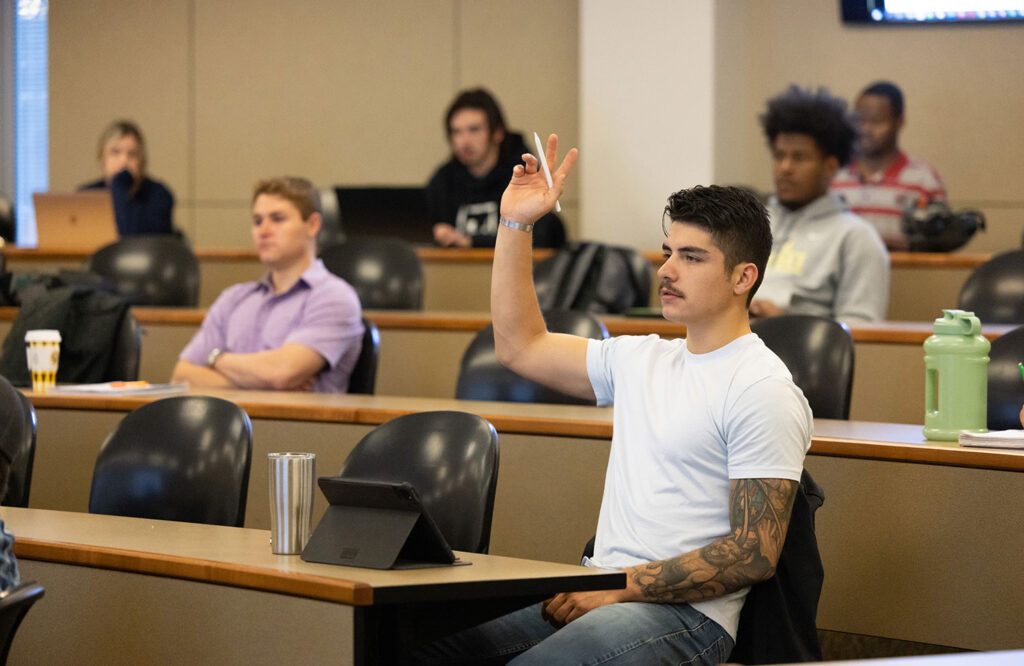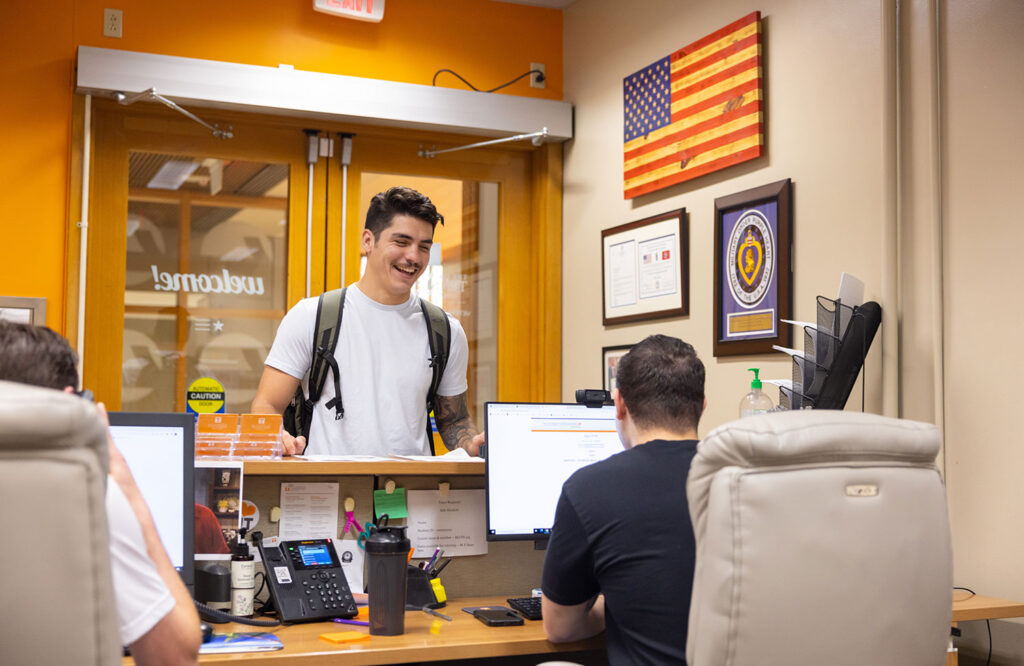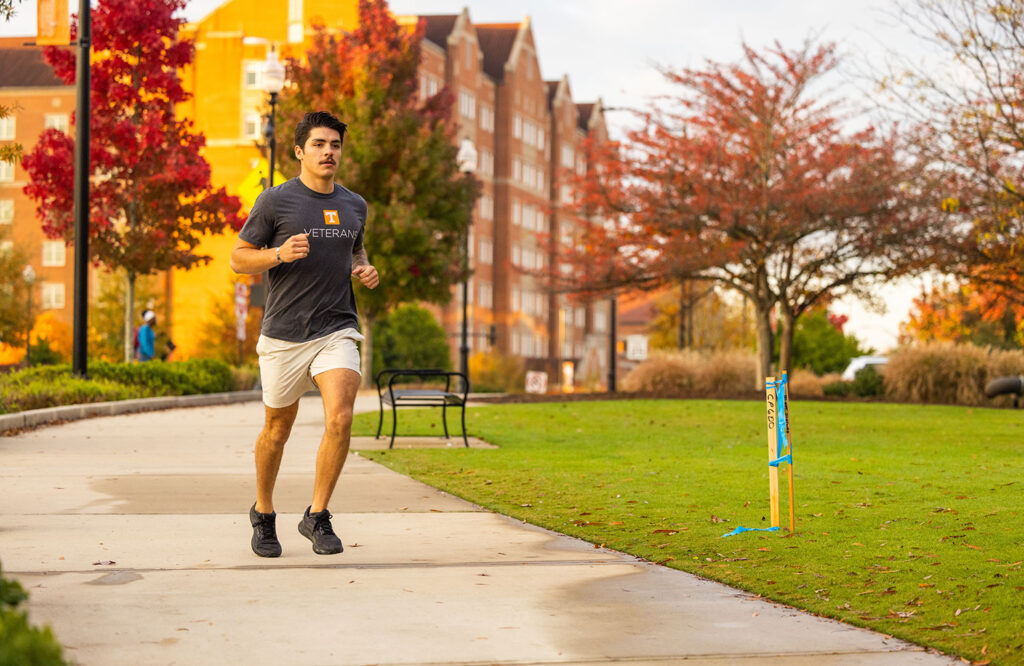UT has built an ecosystem of student support initiatives to make sure all Vols have the best chance at success.
After serving for five years in the US Army, Oregon native Trevor Vickery traveled around the country, searching for the right school to use his GI Bill benefits. Once he discovered the extensive network of support for veterans at UT, he knew he had found his new home.
When he left the military, Vickery knew he wanted to attend a university that accepted the GI Bill and provided out-of-state waivers for student veterans. While researching UT, he discovered that it also has a center dedicated solely to making sure that veterans like him succeed.
“I clicked on the Veterans Success Center and I was like, ‘Oh, they have a full center for the military—this is awesome.’ This really is a military friendly school,” Vickery says.
UT is highly ranked among public universities for its support of veterans, based on initiatives like the Veterans Success Center and the fact that in-state tuition is available to veterans, active-duty military personnel, reservists, Tennessee National Guard members, and Army and Air Force ROTC cadets. The university is ranked as military friendly not only for veterans but also for spouses of veterans.
Over the past two years, as the national college retention rate has dropped by almost two percentage points, UT’s rate has gone up. Last spring, 96 percent of first-year students returned for their second semester—the highest rate in recent years. UT has developed an ecosystem of programs like the Veterans Success Center to make sure that students have the best chance at success.
Helping Veterans Transition to College
After being accepted to the university for the fall 2021 semester, Vickery, who is also a first-generation college student, made his way across the country to Knoxville in a camper.
Transitioning from the very structured life of a soldier to the life of college student was not easy. Before coming to UT, Vickery served in the 75th Ranger Regiment and did two tours of duty in Afghanistan. The Veterans Success Center helped him move into the life of a college student by showing him that there were people who understood where he was coming from and that it was OK to ask for help.
Vickery says staff at the center helped him with everything from the admissions process and registering for classes to finding his way around campus and signing up for study sessions. They even helped him through the process of buying a house.
“Even if someone didn’t know the answer at the Veterans Success Center, they would find someone who did,” Vickery says. “Without the center I wouldn’t have made it, because it was a struggle. I moved to Tennessee with no family, no friends, nothing.”
Becoming a Mentor to Other Veterans
Vickery’s experience spurred him to volunteer his own time as a peer mentor for the new Veteran Impact Program, which launched in August with 31 students. The first-of-its-kind program provides incoming student veterans with academic and professional programming, resources, and support to help them successfully navigate the transition to student life.
“We want to give them the best opportunity to be retained and ultimately graduate with a college degree in hand,” says Tom Cruise, assistant director of the Veterans Success Center and an Air Force veteran who used his GI Bill benefit to earn a bachelor’s and master’s degree at UT.
As a peer mentor, Vickery assists the academic coach in the classroom but also works to develop a more personal relationship with the program’s students to help guide them and keep them on track—academically, socially, and mentally.
“A lot of these veterans are doing the same thing we did, as far as coming here alone with no family, no friends, no anything,” Vickery says. “And it’s hard to transition from that military community of some of your best friends and finding it all over again.”
Supporting Student Success
The Veterans Success Center is just one of many innovative programs at UT enriching student experiences and improving outcomes. Take a look at a few other ways UT supports students success.
Vol First-Year Experience
A student’s first year in college sets a foundation for the rest of their academic years, and UT provides experiences to make sure that foundation is strong. Incoming students take part in the Vol First-Year Experience, which includes new Vol orientation. Leading up to and during the first few weeks of the fall semester, new students go through three phases of orientation to help prepare them for the transition to college. As part of a first-year seminar course, students take the CliftonStrengths assessment to identify their strengths and learn how to use them to their advantage.
Vol Success Teams
In fall 2020, the Division of Student Success launched Vol Success Teams, an initiative that supports student success by assigning every student a team composed of an academic coach, an academic advisor, and a financial aid counselor. This helps students have easy access to services and familiar faces that will stay with them throughout their time on Rocky Top. Students who engage with their team report higher GPAs and a greater sense of belonging.
UT Success Academy
The division recently launched the UT Success Academy, aimed at helping Black and Latino men—who historically have lower retention and graduation rates than other students despite starting with comparable GPAs and test scores.
The academy, which moves a group of students through four years of strengths-based studies and relationship building, provides an annual renewable scholarship of $2,000, and 25 students from each cohort have the opportunity to receive funding for study abroad experiences. This helps relieve some of the financial burden on students.
The academy was so successful in its first year that the university used the concept to create the Veterans Impact Program and is planning to create a similar academy for first-generation students.
First-Generation Initiatives
Eighteen percent of UT’s Class of 2026 are first-generation students, meaning their parents didn’t graduate with a four-year college degree. Without parental experience to lean on, these students can have a hard time navigating life at a university.
UT’s First-Generation Initiatives create opportunities for academic, career, social, and cultural engagement for these students throughout their academic journey. Students can find support and a sense of community and belonging and get connected to campus resources, organizations, departments, and professionals. Families of students can also take part in the initiative through educational and engagement opportunities.
Among other support events throughout the year, first-generation students are invited to a special convocation to kick off their academic journey and a First-Generation Graduates Reception to celebrate their success.





